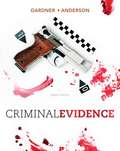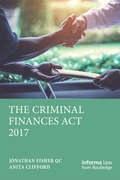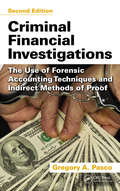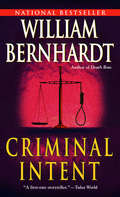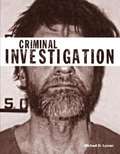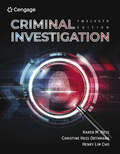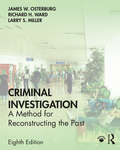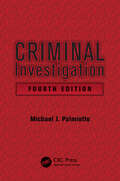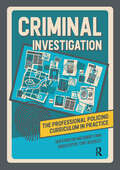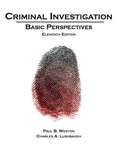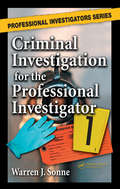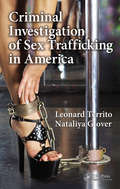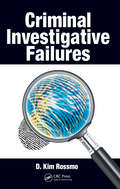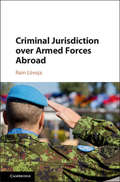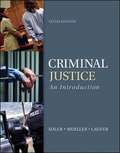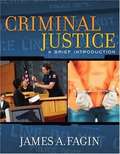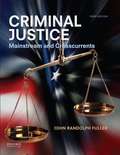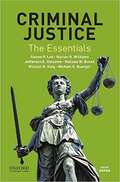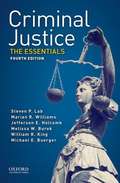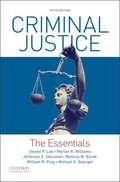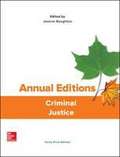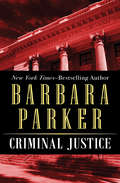- Table View
- List View
Criminal Evidence (Eighth Edition)
by Thomas Gardner Terry AndersonWhat makes evidence admissible or inadmissible in court? You'll know the answer once you read CRIMINAL EVIDENCE: PRINCIPLES AND CASES, 8th Edition. Whatever your future career in the justice system, this book outlines all you need to know about criminal evidence and its use. Packed with stories and cases as well as the most up-to-date legal information available, it's the most relevant and engaging resource of its kind.
The Criminal Finances Act 2017
by Jonathan S Fisher Anita CliffordThe Criminal Finances Act 2017 introduced the most radical change to tackling money laundering and corruption, recovering the proceeds of crime and counter terrorist financing, since the Proceeds of Crime Act was passed in 2002. This book will provide an excellent commentary on the changes introduced by the Act, with practical insights and an explanation of the Act’s provisions. Topics included are: money laundering; unexplained wealth orders; terrorist property; tax evasion; and reasonable prevention procedures. Authored by Jonathan Fisher QC and Anita Clifford, barristers specializing in proceeds of crime and financial crime cases, this book will be of great interest and importance to all legal professionals working in the financial sector.
Criminal Financial Investigations: The Use of Forensic Accounting Techniques and Indirect Methods of Proof, Second Edition
by Dale L. June Gregory A. PascoUnderstanding the financial motivations behind white collar crime is often the key to the apprehension and successful prosecution of these individuals. Now in its second edition, this volume provides direct instruction on the how to aspects of criminal financial investigations, taking readers through the different approaches used in gathering evidence and demonstrating how to present circumstantial evidence to a judge or jury in a simple and convincing manner. Written by a former Special Agent with the Criminal Investigation Division of the U.S. Internal Revenue Service, the book sets out a methodology enabling readers to identify, pursue, and successfully prosecute white collar crime.
Criminal Intent (Ben Kincaid Series #11)
by William BernhardtWhen a priest with radical ideas and a parish council with traditional values lock horns over the beliefs they hold most sacred, there's bound to be controversy--and consequences. But murder crosses the line between committing a sin and committing a crime, turning a battle over faith into a battle for justice. And smack in the middle of the explosive case is Tulsa attorney Ben Kincaid. Kincaid rescued Father Daniel Beale once before. When the priest's renegade views and violent temper nearly cost him his position as rector of St. Benedict's Church, Ben intervened and saved the day. Now Beale is the prime suspect in the brutal murder of a female parishioner--though lack of evidence has left the case unsolved. But as Father Beale struggles to escape the shadow of suspicion, another woman is savagely slaughtered. And this time, Ben himself discovers Beale literally red-handed . . . with the blood of the victim. As Father Beale declares his innocence, Ben and his team feverishly work to build a defense that will deliver the man of God from a date with the death chamber. But each new revelation that emerges in the packed courtroom only serves to tilt the scales increasingly in the prosecution's favor. And Father Beale's own shocking testimony ignites a firestorm of controversy that could doom his last best hope for acquittal. In his heart and in his gut, Ben knows Father Beale is innocent. But proving it means taking a leap of faith that will plunge Ben into the whirlpool of dark secrets and dangerous intentions that surround St. Benedict's. And ultimately, it will force the idealistic attorney to confront the chilling face of evil in the most unexpected of places. Criminal Intent proves beyond a reasonable doubt that the author of Murder One has earned his critical reputation as the master of the courtroom drama whose novels of legal suspense consistently offer a one-of-a-kind reading experience. From the Hardcover edition.
Criminal Investigation: The Art And The Science
by Michael LymanCriminal Investigation: The Art and the Science ― by nationally recognized criminal investigation expert Michael Lyman ― is a clear, thorough examination of the fundamentals of criminal investigation and forensic science, as currently practiced throughout the US. It explores past experiences of investigators alongside forensic and technological innovations. Paralleling the steps of the criminal investigation, the 9th edition has been extensively updated with new and revised material, a new chapter on investigating officer-involved shootings, and updated case studies and graphics.
Criminal Investigation
by Michael D. LymanCriminal Investigation: A Brief Introduction is written in an innovative "brief" format, making it more easily understood by students and more user-friendly for instructors. It presents crime detection as a field that relies heavily on past experiences of investigators as well as recent practical, forensic, and technological innovations. This new text blends scientific theories of crime detection with a practical approach to criminal investigation and follows the belief that sound criminal investigations depend understanding the science of crime detection procedures and the art of anticipating human behavior.
Criminal Investigation
by Christine Hess Orthmann Kären Matison Hess Henry Lim Cho Jennifer Molan ChoMaster modern investigative principles and practices using the field-based approach strongly grounded in current research with Hess/Hess Orthmann/Cho/Molan's CRIMINAL INVESTIGATION, 12E. This best-selling text introduces established tools, practices and policies while detailing the latest innovations in investigative technology and science today. The authors clearly demonstrate techniques and practical applications using a captivating, reader-friendly presentation. The latest discussions introduce advancements in DNA evidence, incident review and solvability factors, terrorism and homeland security, electronic data searches, new case law, forensics and physical evidence, use of body cameras, and ethics as well as increasing standards of proof for stop versus search and arrest versus conviction. MindTap digital resources help you refine your skills and strengthen your understanding with video cases, career scenarios, chapter quizzes and interactive labs that explore investigative techniques.
Criminal Investigation: A Method for Reconstructing the Past
by James W. Osterburg Richard H. Ward Larry S. MillerA classic in the field, Criminal Investigation: A Method for Reconstructing the Past, Eighth Edition, presents the fundamentals of criminal investigation and provides a sound method for reconstructing a crime based on three major sources of information: people, physical evidence, and records. By breaking information sources into these three major components, the book provides a logical approach that helps students remember and achieve mastery of these essentials. More than a simplistic introductory text, yet written in an easy-to-read, user-friendly format, it offers a broad treatment of criminal investigation. Updated and streamlined since the prior edition, the text covers the foundations and principles of criminal investigation, analysis of specific crimes, and explores special topics including enterprise crime, arson and explosives, computers and technological crime, increasing threats and emerging crime, and terrorism and urban disorder. This discussion of contemporary and future criminal activity teaches students facts about the present as well as the skills to stay current in a rapidly changing field. This book is indispensable for core courses in criminal investigation. Chapters include a variety of helpful charts, tables, and illustrations, as well as discussion questions that provide focus on the most important points. A glossary provides definitions for terms that have specialized meanings, and an online companion site offers an array of resources for both students and instructors.
Criminal Investigation
by Michael J. PalmiottoCriminal investigators need broad knowledge of such topics as criminal law, criminal procedure, and investigative techniques. The best resource for these professionals will distill the needed information into one practical volume. Written in an accessible style, the fourth edition of Criminal Investigation maintains the same reader friendly approac
Criminal Investigation (The Professional Policing Curriculum in Practice)
by Iain Stainton Robert EwinCriminal investigation is an essential topic, running through the new national policing curriculum from volume crime to serious organised criminality. This book provides accessible and comprehensive coverage, with case studies and examples to embed understanding, clear links between theory and practice, and a range of critical thinking and review activities. It examines investigation from inception to conclusion, detailing methods, explaining legal requirements and reflecting on past investigations. The contributory roles of specialists and forensic support are examined to provide an inclusive overview of the whole investigative process.The Professional Policing Curriculum in Practice is a new series of books that match the requirements of the new pre-join policing qualifications. The texts reflect modern policing, are up-to-date and relevant, and grounded in practice. They reflect the challenges faced by new students, linking theory to real-life operational practice, while addressing critical thinking and other academic skills needed for degree-level study.
Criminal Investigation: Basic Perspectives (Eleventh Edition)
by Paul B. Weston Charles A. LushbaughThe text focuses on the fundamentals of inquiry and each element of investigation, and reflects the most recent investigative techniques and technology, and features real-life case studies to help students develop their ability to analyze, evaluate, and reason.
Criminal Investigation for the Professional Investigator (Professional Investigators Series)
by BCPI, CLI, SonneAimed at the busy professional who aspires to become certified in the field, Criminal Investigation for the Professional Investigator details essential techniques a trained investigator will be called upon to perform during the course of a career. The book is authored by a veteran of the NYPD who went on to launch and operate two successful private investigation agencies. It covers crime scenes, death investigations, the art of interrogation, and specific criminal investigations. It also provides important strategies for making arrests and testifying in courtrooms, details the most effective investigative tools to use, and explains the role of criminal defense investigators.
Criminal Investigation of Sex Trafficking in America
by Leonard Territo Nataliya GloverHuman trafficking is the third largest business for organized crime worldwide, next to illegal weapons trading and drugs. Written by well-respected criminal justice scholars, this book examines the criminal investigation of sex trafficking. Providing a multidisciplinary exploration of this topic, the authors discuss:International and national persp
Criminal Investigative Failures
by D. Kim RossmoAvoid Major Investigative TrapsWhat causes competent and dedicated investigators to make avoidable mistakes, jeopardizing the successful resolution of their cases? Authored by a 21-year police veteran and university research professor, Criminal Investigative Failures comprehensively defines and discusses the causes and problems most common to faile
Criminal Jurisdiction over Armed Forces Abroad
by Eyal Benvenisti Rain LiivojaRain Liivoja explores why, and to what extent, armed forces personnel who commit offences abroad are prosecuted under their own country's laws. After clarifying several conceptual uncertainties in the doctrine of jurisdiction and immunities, he applies the doctrine to the extraterritorial deployment of service personnel. Comparing the law and practice of different states, the author shows the sheer breadth of criminal jurisdiction that countries claim over their service personnel. He argues that such claims disclose a discrete category of jurisdiction, with its own scope and rationale, which can be justified as a matter of international law. By distinguishing service jurisdiction as a distinct category, the analysis explains some of the peculiarities of military criminal law and also provides a basis for extending national criminal law to private military contractors serving the state. This book is essential for scholars and practitioners in international and criminal law, especially in military contexts.
Criminal Justice: An Introduction 6th Edition
by Freda Adler Gerhard O. W. Mueller William S. LauferCriminal Justice: An Introduction offers a current, lively and thorough introduction to criminal justice. Students are easily drawn to the intriguing field with coverage of past developments, contemporary issues, and tomorrow's challenges. This edition offers new material on diversity in the Criminal Justice System to help students better understand the system from the perspective of women and minorities. Manageable in terms of size and price, Criminal Justice: An Introduction offers a concise and affordable option to your Criminal Justice course.
Criminal Justice: A Brief Introduction
by James A. FaginA 12-chapter, paperback brief text that is realistic, applied and practical. Criminal Justice: A Brief Introduction is a realistic, applied, and practical text,which introduces students to the real world of criminal justice. Fagin uses clear and simple examples drawn from decades of experience to bring criminal justice alive for students. With a clear and readable style,the author places the criminal justice system in the broader context of American government. James Fagin is a recognized educator in the administration of justice; an expert in areas of contemporary concern, such as transnational terrorism, computer crime, and computer technologies in criminal justice; and has hands-on experience in law enforcement.
Criminal Justice
by James A. FaginCriminal justice is a social institution and a system. As a social institution, the system attempts to meet society's needs for law and order. In the United States, law and order must be won without unwarranted violations of civil liberties and civil rights. As a system, criminal justice depends on due process involving the police, the courts, and corrections at the federal, state, and local levels. Due process is provided through procedural laws with the goal of obtaining justice that is accurate, timely, fair, and humane. Criminal justice also is an academic discipline with a history, a future, and career paths for people who wish to provide public service. This service is built on definitions of crime, the gathering of crime data, and the development of criminal justice agencies and programs.
Criminal Justice: Mainstream and Crosscurrents
by John FullerCriminal Justice: Mainstream and Crosscurrents uses a distinctive crosscurrents theme to teach students about the complexities of the criminal justice system--and help them think critically about critical issues.
Criminal Justice: The Essentials
by Steven LabA flexible and cost-effective alternative to larger texts, Criminal Justice: The Essentials, Sixth Edition, covers all the fundamental issues faced by law enforcement, the courts, corrections, and juvenile justice, leaving detailed specifics and tangential topics to the discretion of instructors to cover in class. With abundant examples-and just the right amount of sidebars and "highlights," Criminal Justice, Sixth Edition, is the ideal resource for introducing students to the essential issues in the field.
Criminal Justice: The Essentials
by Steven P. Lab Marian R. Williams Michael E. Buerger Melissa W. Burek Jefferson E. Holcomb William R. KingA flexible and cost-effective alternative to larger texts, Criminal Justice: The Essentials, Fourth Edition, covers all the fundamental issues faced by law enforcement, the courts, corrections, and juvenile justice, leaving detailed specifics and tangential topics to the discretion of instructors to cover in class.<p><p> With abundant examples--and just the right amount of sidebars and "highlights"--Criminal Justice, Fourth Edition, is an excellent resource for introducing students to the essential issues in the field. Visit the Companion Website for a wealth of student and instructor resources.
Criminal Justice: The Essentials
by Steven P. Lab Marian R. Williams Jefferson E. Holcomb Melissa W. Burek William R. King Michael E. BuergerCriminal Justice: The Essentials, Fifth Edition, covers all the fundamental issues faced by law enforcement, the courts, corrections, and juvenile justice, leaving detailed specifics and tangential topics to the discretion of instructors to cover in class. With abundant examples and just the right amount of sidebars and "highlights" Criminal Justice, Fifth Edition, is the ideal resource for introducing students to the essential issues in the field.
Criminal Justice
by Joanne NaughtonAnnual Editions volume has a number of features designed to make them especially valuable for classroom use; including a brief overview for each unit, as well as Learning Outcomes, Critical Thinking questions, and Internet References to accompany each article.
Criminal Justice (Good Practice In Health, Social Care And Criminal Justice Ser. #Vol. 8)
by Barbara ParkerThe New York Times-bestselling author of Suspicion of Innocence brings her prodigious legal experience and storytelling gifts to this riveting thriller about a disgraced US attorney determined to prove his innocence and get justice Dan Galindo was a highly respected US attorney until a single lapse in judgment cost him everything. A year ago, he refused to put a lying witness on the stand. As a result, a drug kingpin walked, earning Galindo the eternal wrath of the DEA. In the aftermath, his plummy position with Miami's federal prosecutor's office went south, along with his marriage. He's barely scraping by as a lawyer in a rundown office when opportunity comes knocking. Galindo's ex-brother-in-law, a music promoter, wants him to defend a gorgeous rock singer accused of assaulting a police officer. Accepting the case, Galindo is unwittingly drawn into a money laundering scheme and sting operation--involving corrupt cops and a DEA agent with a blood score to settle--in which no one can be trusted. But when he becomes the prime suspect in a high-profile murder, Galindo suddenly finds himself scrambling to prove his innocence in a world where the law is subverted and justice doesn't always prevail.
